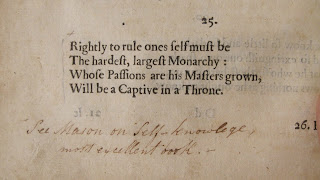Katherine Philips, Poems by the most deservedly Admired Mrs Katherine Philips The matchless ORINDA.
London: J.M. for H. Herringman, 1667
Contemporary calf binding, rebacked, red morocco label with title in gilt
Wing P2033
Adorned with a wonderful engraved bust by William Faithorne, this folio collection of Katherine Philips' Poems is the first authorized edition of her literary work. Philips (1632-1664) vehemently denied that she authorized the pirated edition of her Poems (printed by John Grismond for Richard Marriott in 1664, the year of Philips' death), even though the differences between it and the authorized 1667 edition are few in number and rarely substantive (ODNB). The later, authorized text contains her poems and dramatic translations out of Corneille, Pompey (La Mort de Pompée--1643) and Horace (1640). The printing history and textual transmission of Philips' poetry is an interesting topic, but today I am writing about this book because of its manuscript inscriptions and annotations, which may be of interest to students of reading history and early modern drama.
First of all, this copy was owned by one of the famed "New Bibliographers," the eminent scholar of early modern drama Sir W.W. (Walter Wilson) Greg. Greg (1875-1959) was born and lived at Park Lodge, Wimbledon Common until the outbreak of WWII in 1939, when he moved to Sussex (ODNB). His "The Rationale of Copy-Text" [Studies in Bibliography 3 (1951): 19-36; the link works, but you have to navigate to the correct vol # and click on the article] endures as one of the most important articles on modern textual studies, as do his masterfully precise editions of early modern drama for the Malone Society. He is also well known for his four-volume A Bibliography of the English Printed Drama to the Restoration (London: Bibliographical Society, 1939). Although some of Greg's work on the textual transmission of early modern drama has now been discredited (most notably the "memorial reconstruction" theory posited to explain the playbooks Pollard labeled "bad quartos"), he will always be remembered as one of the most prolific scholars dedicated to the dramatic work of Shakespeare and his contemporaries. I suspect Greg owned this book because of the Corneille translations.
On the verso of Faithorne's engraving are three manuscript annotations: two inscriptions ("Robert Berny" [?] and "Samuel Sandford") and the words "complaint oates [and] plough" (probably in Sandford's hand).
It appears that one of these former owners (again, probably Sandford) added a manuscript note next to Philips' "To Mrs. Wogan, my Honoured Friend; on the Death of her Husband." It reads:
Makes your obedience in
some measure Less
The annotator seems to have intended the note as a gloss of two adjacent lines in the printed text:
For you to grieve then in this sad excess,
Is not to speak your Love, but make it less.
Although Philips' writes that it is "Love" Mrs. Wogan's "sad excess" threatens to diminish, the annotator interprets "Love" as wifely "obedience," a gloss that I think changes the meaning of the line in significant ways.
Finally, in reference to stanza twenty-five of Philips' “L’accord du Bien," an early owner (again, probably Sandford) added another manuscript note. It reads:
See Mason on Self-Knowledge,
most excellent book.
Here the lines "Rightly to rule ones self must be / The hardest, largest Monarchy" reminded an early owner of a recently read and "most excellent" book, namely John Mason's Treatise of Self-Knowledge (1st edn 1732). The reference to this particular text, as well as paleographic evidence from the note and inscriptions, suggest the former owner in question (probably Samuel Sandford) read and annotated the book in the mid-eighteenth century.



















No comments:
Post a Comment